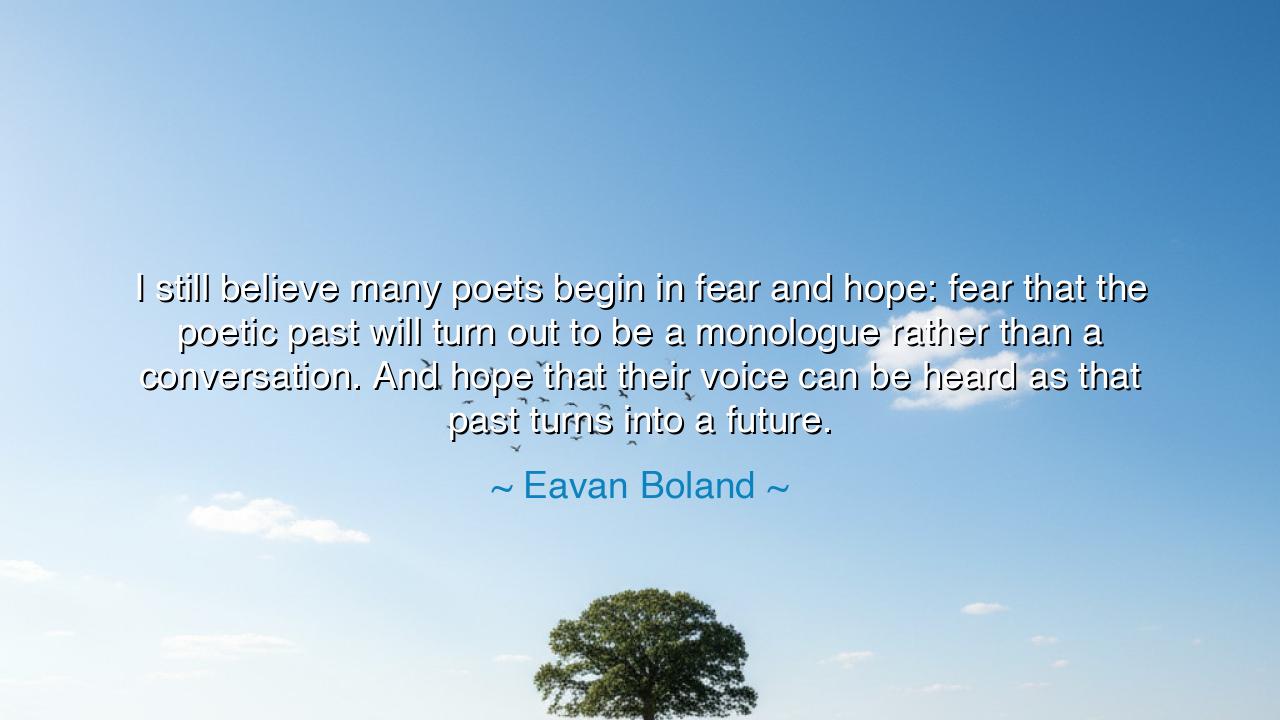
I still believe many poets begin in fear and hope: fear that the
I still believe many poets begin in fear and hope: fear that the poetic past will turn out to be a monologue rather than a conversation. And hope that their voice can be heard as that past turns into a future.






In the world of poetry, the fear and hope Eavan Boland speaks of are the shadows and the light that reside within the heart of every poet. The fear is not merely of failure, but of the silence that looms over the past, the silence of voices long lost. The poet fears that their words, no matter how rich with meaning, may become part of a monologue rather than a dialogue, trapped in the static of time, unable to engage with the world. This is the eternal worry of the poet: that their voice will be swallowed by the weight of tradition, reduced to a faint echo of those who came before. And in that fear, there lies a profound understanding of the past, its power to influence, yet its potential to stifle.
However, this fear is tempered with a deep hope. The poet does not stand alone, even in the solitude of creation. They hope that their voice will rise above the noise of history, that it will be heard, felt, and understood by those who come after them. This hope is not born of arrogance but of a desire for connection. The poet dreams that their words will bridge the chasm between the past and the future, turning the monologue of tradition into a vibrant conversation that transcends time. Their work is not just for the present, but for the future, for those who will come to discover their voice and find meaning in it.
Consider the story of Homer, the blind bard who composed the Iliad and the Odyssey, two of the most important texts in Western culture. Homer spoke in his own time, yet his words have echoed through millennia. He lived in an age where oral tradition reigned, where stories were passed down by word of mouth, generation by generation. Yet, despite the lack of a written language, his voice was heard across time. Homer began his journey with the fear that his poetry would fade into the mists of time. But in the hope of leaving something behind, he created a dialogue that still resonates with us today. His voice has traveled across centuries, transformed into a conversation that stretches from the ancient world to our own.
This same tension between fear and hope can be seen in the works of modern poets, such as Sylvia Plath or Rainer Maria Rilke, who grappled with the weight of their predecessors while longing to create something uniquely their own. Both were keenly aware of the tradition they inherited, yet they sought to break free from it, to carve a path that was distinctly theirs. They feared that their voices would be crushed under the weight of poetic history, but they hoped their words would ring out with power, transforming the past into a living conversation.
The lesson to be drawn here is clear: the fear that all poets face is not one to be avoided, but one to be embraced. For in fear, there is the recognition of the stakes, the awareness of the importance of their craft. It is the hope that keeps them moving forward, for without hope, there can be no true creation. The poet must trust in their ability to bring forth something new, something that will be heard by those who come after them. And in doing so, they must allow the past to live alongside their own voice, shaping it, guiding it, but never silencing it.
To live in this tension is to recognize the power of words to shape both the past and the future. It is a reminder that we, too, can shape the future with our voices, whether through poetry, song, or the quiet words we speak to one another. Legacy is not just a gift from the past, but a call to action in the present, to ensure that our words are heard, and our actions speak across the ages. For in the end, it is not the monologue of the past that matters most, but the conversation we create with it. A conversation that is not just heard, but felt, understood, and passed down for generations to come.






AAdministratorAdministrator
Welcome, honored guests. Please leave a comment, we will respond soon